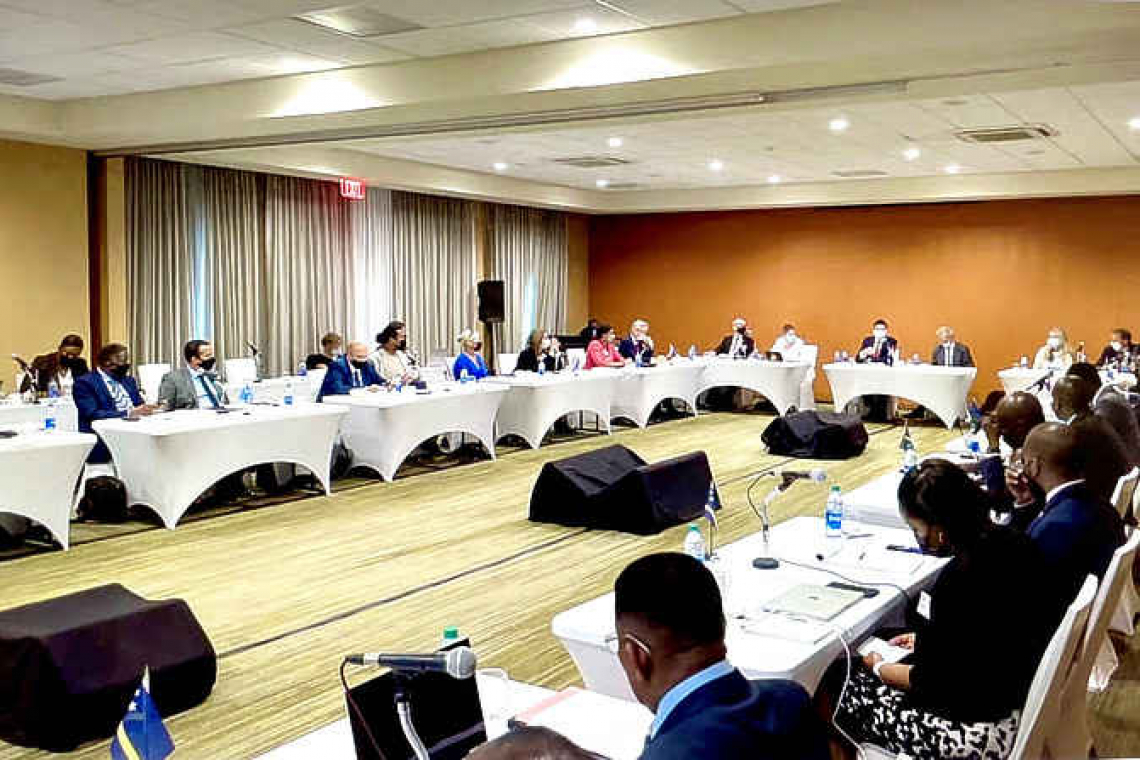An overview of the IPKO meeting in Bonaire on Tuesday.
THE HAGUE/KRALENDIJK--Constructing a clear directive on how agreements are reached, defining plainly which tasks belong to the countries and which to the kingdom, and work on mutual respect and trust, while taking cultural differences into account, were some of the recommendations presented to the governments in the kingdom by one of the several workgroups, during the second day of the Inter-Parliamentary Consultation of the Kingdom IPKO, being held in Bonaire with delegations from the Parliaments of Aruba, Curaçao, St. Maarten and the Netherlands.
Some of the other recommendations, read by chairman of the workgroup, Curaçao Member of Parliament Sheldry Osepa, included setting up courses to address the cultural sensitivities to create more mutual understanding, increasing exchanges of civil servants to enhance knowledge of the countries, and giving the embassies “more face” with greater input from the Dutch Caribbean countries.
Creating more trust among the countries could be achieved by informing each other more often, instead of “surprising” each other and entering into discussions via the media. As for reaching agreements, the parliaments found it important that there was no “vagueness” and no room for misinterpretation afterwards.
A second workgroup looked at collaboration, the Charter and the settling of disputes. Chairman of this workgroup, Arthur Dowers, Member of the Aruba Parliament, read the two main recommendations.
One was that the parliaments should insist that the governments arrive at a proper Dispute Regulation, as prescribed in the Charter. The Dispute Regulation should have the support of all four countries and not solely of the Netherlands, as has been the case thus far.
The second recommendation was to urge the governments to carry out a motion of former Member of the Dutch Parliament’s Second Chamber Ronald van Raak, adopted in July 2019, to give further content to defining the tasks of the kingdom.
Curaçao Member of Parliament (MP) Quincy Girigorie asked whether the Dutch delegation was willing to stand behind the three points of departure that the Dutch Caribbean countries want to see reflected in the Dispute Regulation.
These three points are: the execution of this regulation by an independent body; limiting its scope to legal disputes; and binding advice. The last part is a problem for the Netherlands. Senator Paul Rosenmöller promised that this matter would be discussed in the Dutch delegation.
A third workgroup assessed the state of law, the parliamentary democracy, human rights and good governance. Chairman Curaçao MP Amerigo Thodé said that as to human rights, it was considered important that the Dutch Caribbean countries received support from expert organisations such as the Netherlands Human Rights Council.
The parliaments want to exchange more knowledge about the subject of human rights, but also parliamentary democracy, the state of law and good governance. There needs to be attention to poverty and the effects thereof on the community and the threat that crime originating from poverty poses to the state of law.
Integrity needs to be promoted, and government needs to lead by example, achieving a shift from distrust to trust. Because the media and the importance of reliable information also play a role in this process, it was suggested that a Media Law be worked on for the Dutch Caribbean countries.
The fourth workgroup dealt with liquidity support and attached conditions. Chairman Senator Alexander van Hattem read some of the conclusions. The Dutch Caribbean countries acknowledge that reform is necessary, but don’t agree with the extent and the manner in which the conditions are imposed.
The St. Maarten delegation noted in this regard that the relations with the Netherlands have become more tense and that a “take it or leave it attitude” was used by The Hague. Curaçao MP Giselle Mc William expressed great concern about the required cost-cutting measure of 60 million Antillean and Aruba guilders in healthcare in Curaçao and Aruba, respectively.







